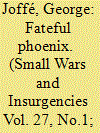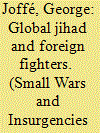|
|
|
Sort Order |
|
|
|
Items / Page
|
|
|
|
|
|
|
| Srl | Item |
| 1 |
ID:
144326


|
|
|
|
|
| Summary/Abstract |
Although the Islamic State in Iraq and al-Sham (ISIS) is seen as a novel manifestation of Islamic extremism, it is in fact the latest, albeit perhaps the most effective, of a long line of revivalist movements in the Islamic and the Arab worlds. Its motivations – hisba and jihad – differ little from its predecessors and its ambitions – to create a state organised in accordance with the precepts of the Islamic caliphate – reflect a long-standing Islamic ambition. It differs, of course, in terms of the sophistication of its political and military strategies, which mirror the contemporary complexities of the world in which it operates, but its objectives recall long-standing Islamic ideals, even if articulated in radically brutal and extremist ways. More importantly, perhaps, ISIS or Da’ish, to give it its Arabic sobriquet, reflects the enormous degree of resentment inside the Middle East at the ways in which Western powers have intervened in regional affairs over recent years, particularly their support for regimes and economic systems there that have betrayed, in the popular imaginary, the essential principles of social justice that lie at the root of Islamic vision of ideal social order. Indeed, in many respects, its analysis of the world in which it operates and of the objectives it seeks differ little in essence from those any other resistance and rejectionist movement, whether religious or sectarian. More specifically, it has been the sectarian conflict that resulted from the reversal of political order in Iraq as a result of the 2003 American-led invasion that has driven the success of the movement in capturing widespread Sunni support. Whether it can manage the complexities of the administration of a state remains open to question.
|
|
|
|
|
|
|
|
|
|
|
|
|
|
|
|
| 2 |
ID:
147715


|
|
|
|
|
| Summary/Abstract |
One question that has been unresolved since the current phase of extremism began in the early- to mid-1990s has been whether or not there is a global structure to the jihadi phenomenon. This paper argues that no such definable structure exists, although regional, national, and local networks may well share common objectives and ideological ambitions. There has, in short, been a process of global branding that has developed that, in structural terms, corresponds to a ‘network of networks’. These objectives and the related praxis, moreover, have evolved over the years, going through three distinct stages of development, encapsulated in the strategic distinctions between al-Qa’ida, Ansar al-Shar’ia, and the Islamic State (Da’ish). Allied to this is a second consideration; namely that the formal ideological inspiration and justification for extremist activities is a set of integrated common insights that form a coherent ideology derived from a literalist interpretation of Islam, Salafism. A further aspect of the Salafi–jihadi phenomenon is to what degree this formal ideology is the real explanation of the appeal of these movements to their adherents, particularly to the so-called ‘foreign fighters’ – those who volunteer from countries not directly implicated in the specific conflicts in which they participate. This paper will argue that the phenomenon is far more complex than the superficial appeal of jihadist ideology would suggest. Finally, the paper will attempt to sketch out what the underlying causes of the intense wave of extremism sweeping the Middle East and North Africa might be and to what extent ‘blow-back’ from returning jihadis should be of concern to home governments.
|
|
|
|
|
|
|
|
|
|
|
|
|
|
|
|
| 3 |
ID:
162256


|
|
|
|
|
| Summary/Abstract |
At the end of June 2014, Abu Baqr al-Baghdadi, the leader of what was to become Da’ish or the Islamic State, announced at the main mosque in Mosul the creation of an ‘Islamic caliphate’ with himself as caliph. With its creation, he announced, the division of the Middle East, forced upon the region by the 1916 Sykes–Picot agreement, was ended, to be replaced by a territorially limitless caliphate for all Muslims. Despite the obvious political rhetoric that the announcement involved, al-Baghdadi’s aspirations raised interesting questions of historical and legal interpretation. Quite apart from what the Sykes–Picot agreement actually established, to what extent, for instance, is there an innate contradiction between visions of state and boundary in international law and the Islamic concept of the caliphate? How have those concepts evolved over the past century and how inimical are contemporary views of ‘the caliphate’ to established principles of territorial delimitation? And, to what extent do the actual territorial delimitations of Middle Eastern states reflect pre-colonial patterns of spatial division rather than simply the consequences of colonial imposition? How distinct, in short, are the apparently opposed concepts of state and caliphate in the contemporary world? This article will attempt to show that the points of similarity between them are probably far greater than is usually recognised.
|
|
|
|
|
|
|
|
|
|
|
|
|
|
|
|
|
|
|
|
|